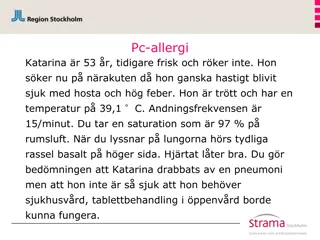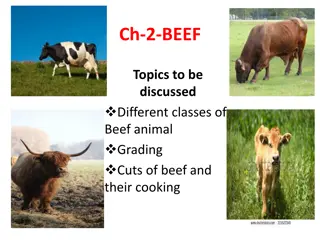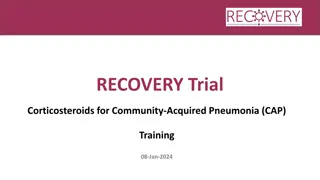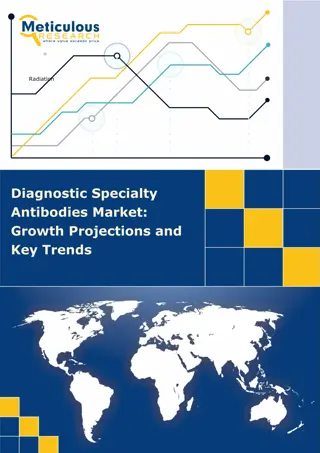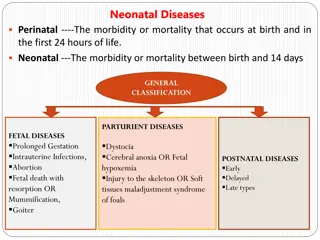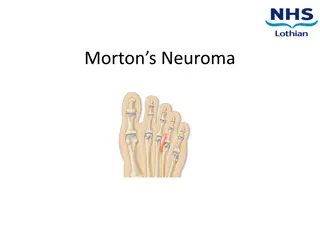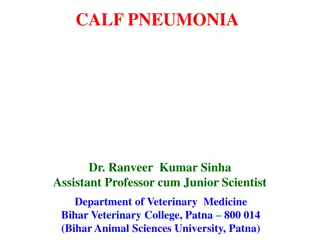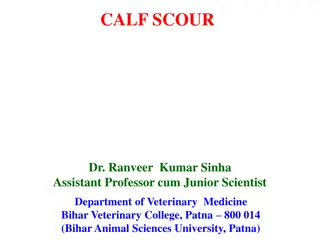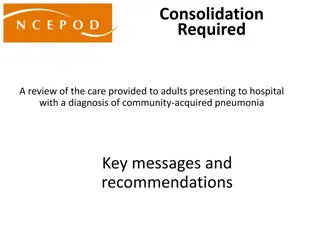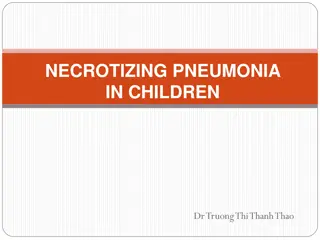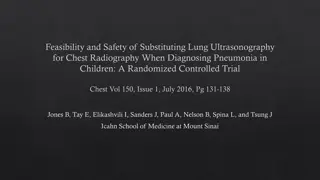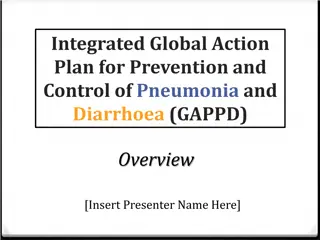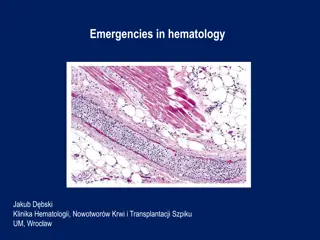DERMATOLOGY AND RHEUMATOLOGY
Staphylococcal Scalded Skin Syndrome (SSSS) is a serious condition characterized by red blistering skin resembling burns. It is caused by toxins from Staphylococcus aureus, leading to exfoliation of the skin. Common in infants, the elderly, and immunocompromised individuals, SSSS requires prompt dia
0 views • 89 slides
The Dust Bowl: Impact of the 1930s Drought
The Dust Bowl of the 1930s was a devastating period marked by severe drought, high winds, and dust storms in the Great Plains. It affected states like Texas, Oklahoma, Kansas, and more, leading to ruined crops, livestock losses, dust pneumonia deaths, and economic hardships. The lack of soil conserv
3 views • 14 slides
Evaluation and Treatment for Pneumonia in Patient with Penicillin Allergy
A 53-year-old woman, Katarina, presents with sudden illness of cough, high fever, and fatigue. With signs of pneumonia, but allergic to penicillin, the decision involves choosing appropriate treatment options such as PcV and considering past allergic reactions and infection history. Evaluating poten
3 views • 20 slides
Nursing Care for Ventilator-Associated Pneumonia (VAP)
Ventilator-Associated Pneumonia (VAP) is defined as lung parenchyma inflammation occurring 48 hours or more after endotracheal intubation and mechanical ventilation initiation. It is a common nosocomial infection in ICU patients, with significant morbidity and mortality rates. Etiology of VAP involv
2 views • 24 slides
Exploring Human Biochemistry: Anatomy, Systems, and Diseases
Delve into the intricate world of human biochemistry through a comprehensive exploration of the anatomy, systems, and diseases affecting the body. From the respiratory and circulatory systems to discussions on common ailments like colds, influenza, and pneumonia, this content provides an insightful
4 views • 42 slides
Understanding Pneumonia: Causes, Classification, and Risk Factors
Pneumonia is an infection of the lower respiratory tract that can be classified anatomically and etiologically. The common causes include bacterial, viral, and fungal pathogens, as well as aspiration pneumonia. Factors such as immune deficiency, overcrowding, and poor hygiene can increase the risk o
10 views • 37 slides
Understanding Different Classes of Beef Animals and Their Grading
Different classes of beef animals, including cow, bull, calf, ox, heifer, and more, are discussed along with their characteristics and purposes. The process of grading beef, which provides information on taste and palatability, is also explained. Additionally, cuts of beef and their cooking methods
0 views • 20 slides
RECOVERY Trial: Corticosteroids for Community-Acquired Pneumonia (CAP) - Overview and Eligibility Criteria
Community-Acquired Pneumonia (CAP) is a common reason for hospitalization globally, with estimated annual fatalities of approximately 2.5 million. The RECOVERY Trial is investigating the use of corticosteroids in patients with CAP suspected or confirmed to be of bacterial origin. Eligibility criteri
1 views • 13 slides
Jorde Calf Varsity Jackets_ The Perfect Blend of Comfort and Style
Jorde Calf varsity jackets represent the perfect blend of comfort and style, making them a valuable addition to any wardrobe. With their superior craftsmanship, customizable features, and versatile design, these leather jackets for Women offer a unique way to express personal style while enjoying th
1 views • 6 slides
Why Jorde Calf Leather Jackets for Men Are a Must-Have
Jorde Calf leather jackets for men are more than just outerwear; they are a testament to quality, craftsmanship, and timeless style. Investing in a Jorde Calf jacket means embracing a piece of fashion history that will continue to serve you for years to come.\nOrder Now:\/\/ \/
0 views • 5 slides
Understanding Delirium: A Micro Learning Module for Clinicians
Delirium is a sudden change in an individual's memory, thinking, and behavior, which requires urgent medical attention. Often misdiagnosed, it can be mistaken for other conditions like depression or dementia. Knowing the signs and symptoms, such as fluctuating confusion, difficulty focusing, and cha
1 views • 9 slides
Diagnostic Specialty Antibodies Market is expected to grow at a CAGR of 4.6% fro
Diagnostic Specialty Antibodies Market by Type (Primary, Secondary), Clonality (Monoclonal, Polyclonal), Technique (WB, Rapid Test, IHC, IP), Conjugate, and Application (Dengue, Malaria, Hepatitis, HIV, E. coli , Tuberculosis, Pneumonia, Cancer)- For
0 views • 6 slides
Understanding Thickened Liquids in Dysphagia Management
Thickened liquids are often recommended for residents with swallowing difficulties to prevent aspiration pneumonia. Recommendations are typically made by speech pathologists, with nursing sometimes adjusting based on availability of therapy. Aspiration pneumonia occurs when substances are inhaled in
2 views • 33 slides
Neonatal Diseases
Neonatal and postnatal diseases in livestock, with a focus on perinatal, neonatal, and postnatal stages. It covers common classifications, causes, and risk factors associated with these diseases, particularly focusing on neonatal diarrhea (Calf Scour). The content delves into noninfectious and infec
0 views • 33 slides
Understanding Achilles Tendinopathy: Causes, Symptoms, and Management
Achilles tendinopathy refers to pain, swelling, and physical impairment of the Achilles tendon. The causes include excessive loading, tight calf muscles, increased body weight, and biomechanical factors. Symptoms range from pain along the tendon to restricted ankle movement. Diagnosis involves a hea
0 views • 12 slides
What is Pneumonia What to Eat and Avoid in it
Pneumonia is a serious infection that requires careful management, especially in children. Ensuring properhydration and a balanced diet rich in proteins, vitamins, and probiotics can aid in recovery
0 views • 7 slides
Measuring Calf Circumference in Adults: Hands-on Anthropometry Module 9
Calf circumference measurement in adults aged 18 years and above is essential for nutrition studies. This presentation provides detailed instructions on how to measure calf circumference accurately using standard procedures and tools. It covers preparation steps, measurement techniques, and data cap
1 views • 9 slides
Understanding Morton's Neuroma: Causes, Symptoms, and Management
Morton's Neuroma is a painful condition affecting the nerves in the front of the foot, commonly caused by factors like tight calf muscles, inappropriate footwear, and toe deformities. Symptoms include altered sensation and various types of pain. Diagnosis involves a physical examination, and managem
0 views • 13 slides
The Fascinating Elephant Life Cycle Explained
Explore the three main cycles of an elephant's life - Baby, Adolescent, and Adult. Discover how a baby calf starts its journey, an adolescent leaves the main herd, and an adult matures after 18 years. Engage with captivating images depicting each stage.
0 views • 6 slides
Insights into the Month of Tammuz in the Jewish Calendar
The month of Tammuz holds significant historical and spiritual importance in the Jewish calendar. It is a time to guard the heart and eyes, worship, and align with righteousness. This period marks events such as the sin of the golden calf, destruction of the Temple, and the need for deep introspecti
0 views • 23 slides
Comprehensive Overview of Pneumonia: Causes, Epidemiology, and Management
Pneumonia is an inflammatory lung condition that can be caused by viruses, bacteria, or other microorganisms. It affects millions of people worldwide, with a significant impact on newborn infants. The presentation covers the definition, epidemiology, types, etiology, risk factors, and management of
0 views • 27 slides
Visual Guide to Human Anatomy and Systems
Explore detailed images of human body parts and systems including face, thigh, head, hair, eye, nose, mouth, chest, arm, elbow, hand, leg, knee, foot, forehead, neck, ear, lip, tongue, tooth, teeth, finger, waist, calf, muscle-skeletal system, skull, shoulder, rib, spinal cord, hip, limbs, joints, a
0 views • 21 slides
Understanding Calf Pneumonia: Symptoms, Treatment, and Consequences
Calf pneumonia is a significant disease in calves aged one to five months. It is essential to diagnose, treat, and prevent this multifactorial disease for the cattle industry. With types, causes, symptoms, and consequences discussed in detail, the content also covers treatment options like antibioti
0 views • 13 slides
Understanding Calf Scours: Causes, Symptoms, and Treatment
Calf scours, a prevalent disease in cattle, can lead to severe dehydration and health issues if left untreated. It is not a single disease but a clinical sign of various underlying causes. Identifying symptoms, such as diarrhea and dehydration, and providing timely treatments like fluid therapy and
0 views • 10 slides
Livestock Data Management and Recording Guidelines
This documentation outlines the correct procedures for submitting livestock data, including details on birth notifications, calving information, AI processes, calf identification, and more. Topics covered include birth dates, twin identification, AI horn codes, dam and sire identification, calving e
0 views • 11 slides
Addressing Challenges in the Cattle Market: A Call to Action
Explore the concept of Black Swan events in the cattle market and how they can affect market dynamics negatively. The presentation by R-CALF USA delves into instances where markets respond counter to fundamentals and overreact to minor stimuli. Issues such as high captive supply levels and import sp
0 views • 12 slides
Understanding Cattle Management and Classification
Cattle, belonging to the genus Bos, are classified into three types - Bos Taurus, Bos Indicus, and Bos Africans. They are ruminants with fixed hollow horns, udders with four teats, and males have teats on the scrotum. Cattle are utilized for milk production, agriculture, and meat manufacturing. They
0 views • 70 slides
Vocabulary Lesson on Actions and Nouns
Explore various action words and corresponding noun forms in this vocabulary lesson. Learn about verbs like groom, share, and flap, along with their noun counterparts such as calf, cushion, and claw. Expand your understanding of language by discovering how animals and humans use these words in every
0 views • 24 slides
Review of Care for Adults with Community-Acquired Pneumonia
This review focuses on the care provided to adults diagnosed with community-acquired pneumonia (CAP) in hospitals. Key findings include the importance of accurate diagnosis, clinical decision making, and antibiotic management. The study assessed the quality of care through various questionnaires and
0 views • 23 slides
Overview of Necrotizing Pneumonia in Children
Necrotizing pneumonia in children is characterized by necrosis of pulmonary tissue, leading to the formation of small cavities containing necrotic debris or fluid. Staphylococcus Aureus and Streptococcus Pneumoniae are common pathogens. Treatment involves a prolonged course of IV antibiotics tailore
0 views • 34 slides
Antibiotics in Action: Pneumonia Management with Ceftriaxone
Dr. Alyssa Castillo presents strategic antibiotic selection tools for common infections like pneumonia, UTI, and cellulitis, focusing on frequently utilized antibiotics like ceftriaxone. The case study explores treating a 55-year-old pneumonia patient with IV ceftriaxone and discusses additional ant
0 views • 55 slides
Understanding Plantar Fasciopathy: Causes, Symptoms, and Management
Plantar Fasciopathy, also known as Plantar Heel Pain, is characterized by inflammatory or degenerative changes in the plantar fascia leading to heel pain. Causes include weight-bearing activities, tight calf muscles, obesity, foot mechanics, and comorbidities like diabetes. Symptoms involve heel and
0 views • 13 slides
Understanding Hospital-Acquired Pneumonia: Epidemiology, Etiology, Diagnosis & Treatment
Hospital-acquired pneumonia is a serious infection occurring at least 2 days after hospital admission, leading to complications and mortality. It can be classified into VAP and HCAP, with various predisposing factors and microbiological causes. Recognizing clinical features and prompt treatment are
0 views • 29 slides
Insights into Israel's Experience and the Golden Calf Incident in Exodus
Explore the pivotal events in Exodus, from the plagues in Egypt to Israel's encounter at Mount Sinai, culminating in the Golden Calf incident. Witness God's provision, Israel's struggles, and the lessons for us today in understanding idolatry, impatience, and the desire to see God.
0 views • 6 slides
Recognizing Danger Signs During Pregnancy and Labor
Common danger signs during pregnancy include decreased fetal movement, persistent dizziness, overheating, heart palpitations, and swelling in the calf, feet, and hands. It is essential to pay attention to these signs and seek medical help promptly to ensure the well-being of both the mother and baby
0 views • 30 slides
Utility of Lung Ultrasonography in Pediatric Pneumonia Diagnosis
Pneumonia, a leading cause of pediatric mortality globally, presents diagnostic challenges as history and physical exams may not reliably differentiate viral lung infections from bacterial pneumonia. This study explores the feasibility and safety of substituting lung ultrasonography (LUS) for chest
0 views • 21 slides
COMBACTE-CARE: Combatting Bacterial Resistance in Europe - Study Overview
A Phase III study comparing the efficacy, safety, and tolerability of aztreonam avibactam (ATM-AVI) and meropenem colistin (MER-COL) for treating serious infections caused by Gram-negative bacteria, including MBL-producing pathogens. Approximately 300 patients with complicated intra-abdominal infect
0 views • 9 slides
Global Action Plan for Prevention of Pneumonia and Diarrhoea
The Integrated Global Action Plan for Prevention and Control of Pneumonia and Diarrhoea (GAPPD) aims to address the significant impact of these diseases on children under five globally. Released by WHO and UNICEF, the plan focuses on protecting children, preventing diseases, and treating illnesses t
0 views • 17 slides
Comprehensive Investigation of a 72-Year-Old Retired Market Researcher with NHL
Mrs. GE, a retired market researcher, presents with increasing fatigue, night sweats, abnormal blood film, and splenomegaly. Her medical history includes surgeries and hypertension. Examination reveals reduced air entry in the chest and calf swelling. Further investigations indicate a large B-cell l
0 views • 21 slides
Emergencies in hematology
A 59-year-old patient with chronic lymphocytic leukemia presented with pneumonia and disease progression. Refusing chemotherapy, he developed severe pneumonia and worsening symptoms. Laboratory tests revealed critical values for leukocytes, hemoglobin, and thrombocytes, along with abnormal biochemis
0 views • 27 slides


